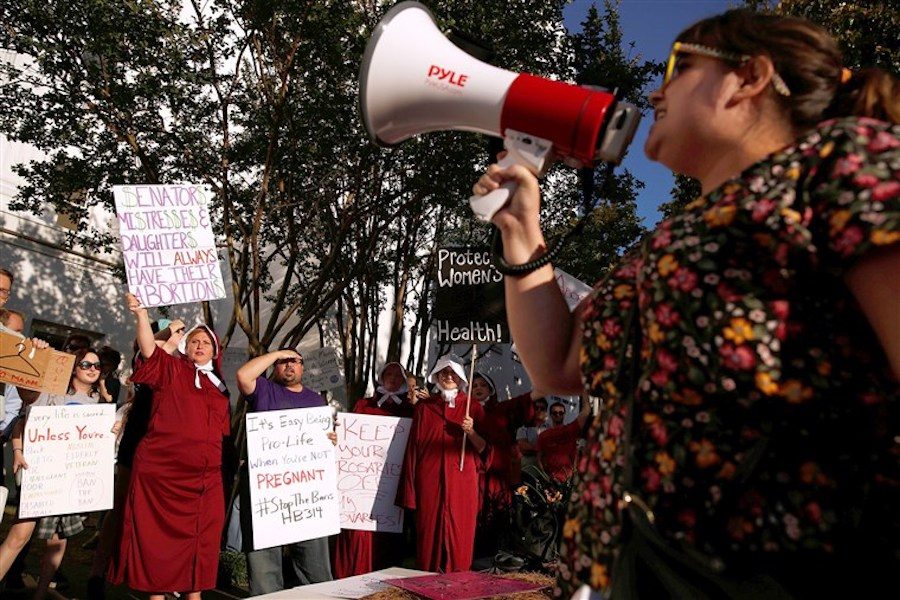Abortion legislation
Protesters gathered outside of Alabama’s State House on Tuesday, May 15, after the passing of the nation’s strictest abortion bill. The state’s governor, Kay Ivey, said the following in a press release, “To the bill’s many supporters, this legislation stands as a powerful testament to Alabamians’ deeply held belief that every life is precious and that every life is a sacred gift from God.”
May 24, 2019
The Alabama House of Representatives and Senate passed House Bill 314 last Tuesday evening to criminalize all abortions, with an exception if “necessary in order to prevent a serious health risk to the unborn child’s mother.” Shortly after the passing vote of 25-6 was finalized, the state’s governor signed the bill into law while protesters began to gather outside of the statehouse. Other than the content of the bill itself, uproar sparked after it was revealed that all 25 votes counted in favor of the bill were cast by men.
The bill’s sponsor, Rep. Terri Collins, cited that the bill will be used to draw the Supreme Court’s attention in an attempt for the conservative-leaning bench to overturn the 1973 Roe v. Wade decision. “This bill is about challenging Roe v. Wade and protecting the lives of the unborn because an unborn baby is a person who deserves love and protection,” said Collins after the bill’s passage.
Opposition to the bill suggests that without a legal way of conducting safe abortion procedures, pregnant individuals could use other dangerous methods to terminate their pregnancy. Beliefs around this are validated by the idea that “It’s all about power,” said Jess Putney ‘20. “Whether it’s conscious or not, it’s a thing about [men] having power over women,” continued Putney.
Prior to Tuesday’s decision, Georgia became the fourth state in the union to implement a heartbeat restriction, which criminalizes all abortions after a heartbeat is detected. Missouri’s senate passed a bill to ban the practice after eight weeks of pregnancy, and the Governor of Ohio, Mike DeWine, signed a bill into law last Wednesday to ban most abortions after six weeks.
Throughout the country, a wave of conservative-backed legislation towards restricting the termination of pregnancy has become commonplace in majority Republican houses. “Having no abortion restrictions doesn’t really sit well with me,” said Salvatore Fabbio ‘20. He continued, “We’re electing representatives to represent us, and they vote based on their moral principles.”
In New Hampshire, abortion procedures have remained unrestricted since 1997, and some Granite State politicians are informally proposing laws to ensure the protection of women’s reproductive rights in the state. In a WMUR interview, in the days following Alabama’s vote, a NH Democratic gubernatorial candidate, Steve Merchand, fully supported such a law stating, “I believe strongly that states need to get ahead of what may happen at the court” meaning that future laws should reflect the constitutionality per the Supreme Court’s ruling in 1973.
There are currently no active bills proposed in Concord to change existing laws; however, that has the potential to change in light of Alabama’s “Human Life Protection Act” becoming law. The act will become effective on Nov. 15, 2019.
A week after the events unfolded in the south, “#stopthebans” protests across the country and advocated for the protection of women’s reproductive rights throughout state legislatures.













![Students in Archaeology use tools in a mock excavation. As a class that focuses on hands-on learning, students are able to gain crucial life skills. “[The class] is more hands-on than I thought, and I'm learning way more with physical activities than I do in the classroom,” said student Tess Brown ‘25.](https://cavchronline.com/wp-content/uploads/2024/11/IMG_8390-e1733078359165-278x300.jpg)
